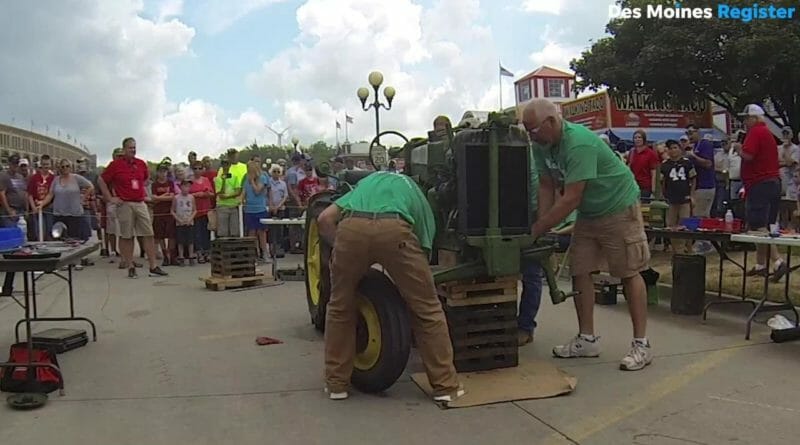Deere & Company and Iowa Are Growing Local Talent
Back in 2019, Iowa knew they had a problem. John Deere knew it too.
If they didn’t take immediate action, the company and the state wouldn’t be able to find the production and skilled trade workers necessary to keep industries growing.
“We looked closely at the locations where we have operations and at the rate we were going, we determined that we wouldn’t be able to find people who are able to do the type of work needed to meet the increasing demand our company is experiencing,” explains David Ottavianelli, director, strategic projects, labor relations, at Deere & Co.
Luckily, a strategic workforce study was able to identify a potential labor source that the company had not traditionally pursued — high school students, who were not planning to attend college. These students represented an ideal workforce that could be training for the specific job requirements that Deere needed.
“The key to capturing the interest of the high school students is reaching them before they even attended high school,” says Ottavianelli. “We needed to show them a line of sight and provide a structured path to get them there.” So, for the past two years, the company has been placing its efforts on increasing the awareness and benefits of manufacturing as a career. “We talk directly to the students and dispel myths they might have about the field as a long-term career.”
Deere also actively engages parents, counselors and school administrators. They host a Parents Night at the plant so parents can envision careers for their children. “Over the last couple of years, I have seen a shift in the perception of the industry both from the parents and the students as to the viability of graduating high school and moving right into a career.”
Partnering with local businesses is also part of the process. “In Iowa, doing business is about the relationship, not the transaction,” explains Jill Lippincott, targeted small business certification project manager at the Iowa Economic Development Authority. “We like to say we have one degree of separation, not six – our employers have access to business, finance, academic and government leaders because we want to hear from them. We engage employers business leaders who help to guide us with turning our research into recommendations and eventually into programs.”
Tapping into this network as well as the Iowa STEM group and the Department of Labor’s registered apprentice program, Deere is working with high school students in an apprenticeship program. Upon high school graduation, students also earn a welding certificate through the apprenticeship program. They have the option of applying this certification toward an associate degree or other certifications. In addition to technical skills students also get training in 26 behavioral competencies, which include communication skills, teamwork, and safety protocols. The program is being used for machinists as well.
Currently, there are 36 students from two school districts in the program, but Ottavianelli feels it has the potential to attract hundreds of students. One reason for his optimism is that Deere is using different technologies as part of the training. “We are using augmented reality (AR) in our welding simulator and you can see the students’ eyes light up as they find it to be a lot of fun.”
Technologies such as AR are an integral part of advanced manufacturing which continues to become a larger part of manufacturing. Advanced manufacturing is Iowa’s largest industry, accounting for more than 17% of the state’s total GDP. There are more than 4,100 manufacturers producing everything from medical devices to aerospace products and construction machinery and food products.
To ensure that talent flows into this sector, Iowa has invested more than $30 million has been in Future Ready Iowa, which supports scholarships and grants that create pathways to high-demand careers. The state also has an Innovation Fund for employers engaging in innovative workforce solutions.
“By leveraging training resources, filling funding gaps in human resource development initiatives, and sponsoring business consortia that address common employment training needs, the skills of Iowa’s workers are enhanced, allowing its industries to grow,” says Lippincott.
For its part, Deere is also expanding its talent training pool by hosting apprenticeships for software engineers, as those jobs will be in demand. Deere’s efforts reflect the state’s direction a well. “Beyond our initiatives and our programs, we are working to help build the skills and talents needed by our employers in our future economy,” says Lippincott. “With the rise of Manufacturing 4.0 technologies, we know that there is concern that this automation will replace jobs, so we work to dispel this myth because, in reality, we will still have the need for talent to support these jobs, but the jobs will look different.”
Educating the workforce that the future of manufacturing is bright is part of Ottavianelli’s mission. “We talk about long-term careers, offer ways to bridge the skills gap and also talk about other benefits the industry can offer such as teamwork, which is of great importance to the future workforce. And that brings us right back to the fact that we reach out to our local students so we can grow local talent. Every student, hired by us, or other manufacturing companies and the accompanying supply chain has a significant impact on future growth.”

